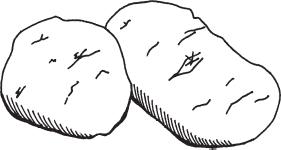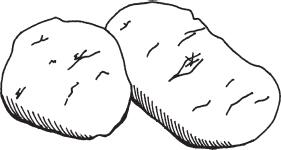Nourishing Traditions: The Cookbook That Challenges Politically Correct Nutrition and The... (111 page)
Authors: Sally Fallon,Pat Connolly,Phd. Mary G. Enig
Tags: #Non-Fiction, #Reference, #Science, #Health

Stuffed Potatoes
Serves 6
6 medium baking potatoes
4 tablespoons butter
½ cup
piima cream
or
creme fraiche1 red onion, finely chopped
½ cup Parmesan or raw Cheddar cheese, grated
2-3 tablespoons basil leaves, chopped (optional)
sea salt and pepper
Bake potatoes as described above. Cut butter into pats and place in a large bowl. When potatoes are done, cut lengthwise and scoop out soft potato flesh into the bowl with the butter. Mash with a potato masher. Mix in cultured cream, cheese, optional basil and onions. Season to taste. Spoon the potato mixture back into the shells and return them to a 150-degree oven to keep warm. If potatoes are not reheated to a high temperature, the enzymes in the cream will be preserved.
Rosemary Potatoes
Serves 6
2 pounds small red potatoes
6 tablespoons
clarified butter
or duck fat (
Duck Fat and Cracklings
)1 teaspoon dried rosemary
½ teaspoon sea salt
Cook potatoes until just tender in a clay pot (
Potatoes
). Place in a pyrex pan with butter or duck fat, rosemary and salt. Bake at 400 degrees, shaking pan frequently, until golden brown.
Potatoes should be stored in a cool dark place but not in a refrigerator, as extreme cold will cause their starch to turn to sugar. Potatoes will sprout if kept in the light too long—avoid eating these sprouts, as they contain poisonous alkaloids. However, there's nothing harmful about eating a potato that has small sprouts after they have been trimmed off. It is important to buy organic potatoes. Most commercial potatoes have been treated with sprout inhibitors that have mutagenic effects. SWF
Cottage Potatoes
Serves 6
6 large baking potatoes
4 tablespoons butter
4 tablespoons extra virgin olive oil
sea salt
These are a nice alternative to deep-fried potatoes. Wash potatoes but do not peel. Cut into ¼-inch slices. Melt butter and oil together. Brush two stainless steel cookie sheets with the oil mixture. Place slices on cookie sheets and brush top sides with remaining oil mixture. Sprinkle with a little sea salt. Bake in a 350 degree oven for about 45 minutes or until golden brown. Check the potatoes frequently for burning. If they are cooking unevenly, remove potatoes as they become done to a heated platter and keep warm.
You will probably be as surprised as I was to find practically nothing in a search of the literature on the effect of fried foods on the digestion. The one article on the subject refutes the old medical prejudice against fried foods.
Boggess and Ivy did their frying experiment with potatoes. They concluded that pan-fried potatoes were more easily digested than French fried potatoes boiled in grease.
Dr. Frank Howard Richardson, commenting on the prejudice against frying, said, "There is a widely held belief, cherished by physicians and laity alike, to the effect that fried foods are harmful in general and that they are particularly harmful for children. An analysis. . .clearly demonstrates that it is not documented with scientific proof or with any proof at all for that matter. Rather, it is merely a repetition and reiteration in many different forms of this unproved old unscientific prejudice."
Food that is pan-fried in butter. . .is no worse than any other cooked food. In fact, Boggess in his experiment found that fried potatoes were more digestible than boiled potatoes. William Campbell Douglass, MD
The Milk Book
Sauteed Potatoes with Onions
Serves 4
4 medium onions, peeled and thinly sliced
8 red potatoes
about 6 tablespoons
clarified butter
or duck fat (
Duck Fat and Cracklings
)sea salt and pepper
There are two secrets to this recipe. One is to parboil the potatoes first, before they are sliced and sauteed; the other is to cook the onions separately.
Plunge potatoes into boiling water and cook about 10 minutes until just barely tender. Remove with a slotted spoon. Slice into ¼-inch slices or cut into quarters. Saute in batches in about 4 tablespoons butter or duck fat in a large frying pan. Meanwhile, saute the onions in remaining butter or duck fat in a separate frying pan. When both onions and potatoes are golden, transfer to a heated serving dish and mix together. Season to taste.
A question arises at this point as to the efficiency of the human body in removing all the minerals from the ingested foods. Extensive laboratory determinations have shown that most people cannot absorb more than half of the calcium and phosphorus from the foods eaten. The amounts utilized depend directly on the presence of other substances, particularly fat-soluble vitamins. It is at this point, probably, that the greatest breakdown in our modern diet takes place; namely, in the ingestion and utilization of adequate amounts of the special activating substances, including the vitamins [A and D] needed for rendering the minerals in the food available to the human system. Weston Price, DDS
Nutrition and Physical Degeneration
Hash Brown Potatoes
Serves 4
4 medium potatoes, washed but not peeled
filtered water
½ cup whey
Whey and Cream Cheese2 tablespoons sea salt
3 tablespoons butter
3 tablespoons extra virgin olive oil
sea salt and pepper
These have a wonderful sour taste. Use the food processor to cut potatoes into a small julienne. Place in a bowl with water, whey and salt. Press potatoes down so that they are entirely covered with water, cover bowl and soak overnight. Pour out water, skim off top layer of potatoes (which will have turned brown), place potatoes in a tea towel and wring out thoroughly. Melt butter and olive oil in a large, heavy skillet. Place half the potatoes in the pan and press down firmly. Sprinkle with salt and pepper, cover pan and cook over medium heat about 5 minutes. Turn potatoes and cook, covered, another 5 or so minutes or until potatoes are well browned. Repeat with second batch.
Variation: Corned Beef Hash
Mix
1 cup finely chopped
corned beef
, 1 medium onion, finely chopped, and 1 red pepper, seeded and cut into a julienne
with potatoes after they have been squeezed dry and saute according to recipe for hash browns.
Know Your Ingredients
Name This Product #18
Potatoes, cottonseed oil, sour cream and onion seasoning, salt. Sour cream and onion seasoning contains: dehydrated whey, dextrose, partially hydrogenated soybean oil, salt, dehydrated sour cream, onion and nonfat dry milk, monosodium glutamate, modified food starch, lactose, sodium caseinate, sugar, dehydrated parsley, garlic powder, citric acid, sodium citrate and imitation flavor.
See
Appendix B
for Answer
Potatoes Anna
Serves 44 medium potatoes
4 tablespoons
clarified butter½ teaspoon dried thyme
½ teaspoon dried rosemary
sea salt and pepper
Potatoes Anna is a traditional French dish, a sort of potato cake that is crisp on the outside and soft in the center. It's the kind of dish that draws raves from dinner guests, and it is not difficult to prepare successfully if the details are adhered to. You will need a 10-inch heavy, nonstick-type skillet with sloping sides, such as an omelette pan. The "cake" also needs to be weighted on top. A 10-inch french tart pan bottom serves this purpose well. It should be buttered, placed on top of the potatoes and weighted down with a several cans.
Wash the potatoes but do not peel. Slice very thinly into a bowl of iced water. Put about
1
/
3
of the clarified butter in the pan and coat the bottom. Dry the potato slices well and arrange them in a swirling pattern to make one layer in the pan. Dribble butter on this layer and a sprinkle of the herbs, salt and pepper. Repeat process for two more layers. Don't be tempted to make a fourth layer if you have slices left over. The results will not be as good if the potato "cake" is too thick.Place the tart pan bottom on top of the potatoes and weight it down. Cook the potatoes over medium heat for about 30 minutes or until bottom is golden. Check to see if anything is sticking and slide the potatoes onto a large plate. Place the pan over the potatoes, hold on to the plate and turn quickly. Reweight the "cake" and cook another 10 to 15 minutes more. Cut into wedges to serve.
Nowhere has technology been so misused as in its application to food processing and preservation, and the most egregious example of this misuse has to be the practice of using toxic nuclear wastes to irradiate our food. Irradiation-induced changes include the formation of free radicals, alterations and cross-linking of nucleotides in DNA and RNA, the enhancement of lipid peroxidation and formation of benz-pyrene quinone, formation of formaldehyde and formic acid from sucrose and the conversion of nitrate to mutagenic nitrite. When water is irradiated billions of extremely reactive free radicals are formed. Kirlian photography, a method of photographing the energetic patterns of a substance, shows that fresh fruits and vegetables shine with light radiating out an inch or more in an aura with vibrant patterns. In contrast, irradiated food has virtually no light halo and has significantly altered patterns.
Children fed irradiated wheat developed extra chromosomes in their white blood cells; and animals fed irradiated pork or bacon demonstrated decreased growth, decreased survival of progeny and increased cancer. Yet irradiation is being promoted as a safe way to preserve our foods. Most spices are irradiated and the process is now approved for use on meats.
Irradiation may indeed kill pathogenic bacteria, but it leaves behind their toxic by-products. Thus, irradiated food may cause food poisoning, even though it tests clean. Irradiated seeds will not sprout and so can be stored under conditions that may encourage fungus and mold. Widespread use of irradiation will not bring improved safety but rather a decline in food sanitation standards. SWF
